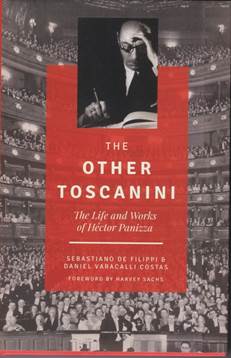
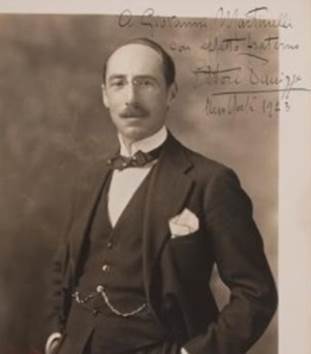
THE OTHER TOSCANINI; The Life and Works of Héctor Panizza by Sebastiano de Filippi & Daniel Varacalli Costas


North Texas University Press; 363 pages;
Click here to order the book; $29.92
At a time when quality books about important personalities of the past are becoming rare, it is a pleasure to read this thoughtful study of one of the towering musicians of the past century, Héctor (Ettore) Panizza, the Argentine conductor/composer of Italian heritage. The book, by two Argentine researchers, frames Panizza's considerable achievements not as a “mark-down” from the great Arturo Toscanini, but make a case that the two conductors were ultimately of equal stature. Was this to somehow get Toscanini’s name on the title, to draw attention of possible readers, or was this deliberately to discuss the two giants as almost equals?
Panizza was born in Argentina to Italian-born parents, not an unusual occurrence in that South American country. If one checks Wikipedia one learns on the Italian Diaspora entry that 63 percent of Argentinians claim all or part Italian heritage. So in the Spanish-speaking world Panizza was Héctor, and in the rest of the world he was Ettore.
The authors seem to embrace Joseph Horowitz’s theory that the “Toscanini Myth” was created by Toscanini and his admirers for his mastery of the art of public relations; the high-profile taking of positions on artistic and political issues that intrigued the mass public, and that Panizza’s musical and conducting skills were every bit as accomplished as the more famous maestro. This appears to be an important issue for the authors of this work.
Panizza was not only a great conductor but also a composer of four operas, operas that were rarely given when the composer was not there to oversee them. I am told that these works are melodic and musically sophisticated.
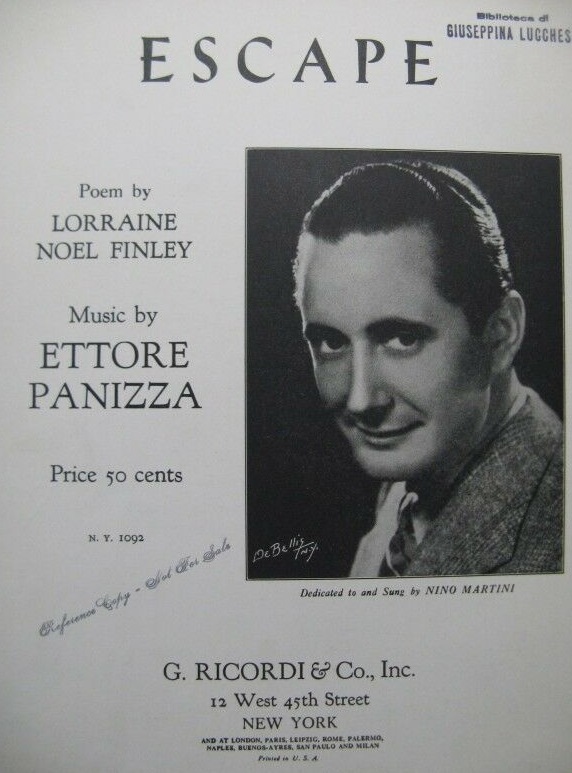
*Click here to listen to a complete recording of his opera Bizancio (featuring Carlos Guichandot)
*Click here to listen to José Cura introducing and singing the Cancion de la Bandera from Panizza's opera Aurora + click here for a complete recording
*Click here to watch rare footage of Panizza's conducting + watch him also here
*Click here to Panizza conducting Aida at the Met in 1938
*Click here to listen to one of Panizza's song compositions
From the Metopera.org database I found that 138 of his 309 Met performances have reviews attached. In his time reviewers were mostly centered on the vocalists and rarely singled out conductors or directors for more than a cursory mention. When the reviewers did discuss the merits of the conducting, Panizza usually got sterling reviews: I quote three from early in his Met career:
Cyrus Durgin in the Boston Globe, La Traviata (1937):
Mr. Panizza proved the dominating genius, joining orchestra and singers in a most sensitive and eloquent performance. How subtle an orchestral score Verdi wrote - without the limits of the mid-19th century Italian style - can be perceived only under such circumstances. The preludes to the first and fourth acts could not have been better phrased or more clear of texture. His tempi were irreproachable. Those recurring melancholy phrases for oboe and clarinet, so marvelously expressive - and usually so often neglected by lesser conductors - were given refreshing emphasis.
Oscar Thompson in the Sun (1937):
Since "Otello" is an opera in which the orchestra is on a plane of importance equal to that of the vocalists, much of the success of the revival was fairly attributable to Ettore Panizza's skillful and authoritative conducting. His instrumental ensemble played well and the chorus was a credit to Fausto Cleva.
Oscar Thompson in Musical America re Salome with Marjorie Lawrence (1938):
The playing of the orchestra under Ettore Panizza assumed a place of dominating importance in an ensemble notably well coordinated. Mr. Panizza's energetic beat evoked sweeping, stinging, tingling sonorities. The string quality, in particular, was richly sensuous in those lyric passages where Strauss most closely parallels his tone poems. The once horrendous discords of sundry furious climaxes had the essential thrust and impact, though with the passing of time the score undoubtedly has lost something of its old shock and stir.
This reviewer is a Chicago Opera aficionado and was disappointed that Panizza’s two big seasons at the Chicago Opera with stellar casts was only mentioned in passing. He shared his conducting duties with the company’s music director, Giorgio Polacco. Perhaps the authors did not have easy access to that company’s history; therefore I have tabulated his two seasons (1922-23 and 1923-24) with dates and casts:
Panizza at the Chicago Civic Opera:
15 November 1922: La Boheme: Edith Mason and Angelo Minghetti
19 November: Parsifal: Cyrena Van Gordon, Forrest Lamont, Mark Caster, Edouard Cotrieul
20 November: Tosca: Rosa Raisa, Giulio Crimi, Cesare Formichi
25 November: Boheme: same as 15 November
30 November: Parsifal: same as 19 November
5 December: Fanciulla del West: Raisa, Crimi, Giacomo Rimini
9 December: Madama Butterfly: Mason, Crimi, Rimini
16 December: Tosca: Claudia Muzio, Crimi, George Baklanoff
20 December: Aida: Muzio, Ina Bourskaya, Charles Marshall, Formichi
21 December: Madama Butterfly: Amelita Galli-Curci, Crimi, Rimini
22 December: Trovatore: Raisa Van Gordon, Crimi, Rimini
26 December: La Boheme: Galli-Curci, Minghetti
27 December: Parsifal: Same as 19 November
31 December: La Juive: Raisa, Mason, Marshall, Minghetti, Virgilio Lazzari
2 January 1923: Trovatore: Muzio, Van Gordon, Crimi. Rimini
4 January: La Juive: Same as 31 December
7 January: Rigoletto: Galli-Curci, Tito Schipa, Formichi
12 January: Tosca: Mary Garden, Crimi, Baklanoff
13 January La Traviata: Galli-Curci, Schipa, Rimini
14 January: Snow Maiden (Rimsky-Korsakoff): Mason, Bourskaya, Van Gordon, Minghetti, Baklanoff
16 January: Forza del Destino: Raisa, Crimi, Rimini, Lazzari
19 January: Gala: Act III Aida, Raisa, Marshall, Formichi
20 January: La Juive: Same as 31 December
BOSTON
23 January: Tosca: Garden Crimi, Baklanoff
24 January: Rigoletto: Florence Macbeth, Schipa, Formichi
27 January: La Boheme: Mason, Minchetti
30 January: Parsifal: Same as 19 November
31 January: Tosca: Muzio, Crimi, Rimini
Season 1923-1924
10 November: Samson et Dalila: Louise Homer, Fernand Ansseau, Formichi
13 November: La Juive: Raisa, Macbeth, Marshall, Minghetti, Lazzari
15 November: Samson et Dalila: Same as 10 November
21 November: La Juive Same as 13 November
23 Noember: L’Africana: Raisa, Macbeth, Crimi, Formichi, Alexander Kipnis,
26 November: Manon: Mason, Ansseau, Desire Defrere
30 November: Carmen: Alice Gentle, Marjorie Maxwell, Ansseau, Cotrieul
1 December: L’Africana: same as 23 November
3 December: Lakme: Galli-Curci, Ralph Errolle, Baklanoff
5 December: Manon: Same as 26 November
7 December: Dinorah: Galli-Curci, Jose Mojica, Rimini
8 December: Carmen: Same as 30 November except Baklanoff for Cotreuil
10 December: La Juive: Same as 13 November
13 December: Otello: Raisa, Marshall, Rimini
16 December: Lakme: Same as 3 December
17 December: L’Africana: Same as 23 November
18 December: Lakme: Same as 3 December
21 December: Barbiere di Siviglia: Galli-Curci, Schipa, Rimini, Vittorio Arimondi, Vittorio Trevisan
22 December: Otello: Same as 13 December
28 December: Cleopatre (Massenet): Garden, Myrna Sharlow, Baklanoff, Kipnis
29 December: Matinee: Dinorah: Same as 7 December
29 December: Evening: La Juive Same as 10 December except Luceille Westen for Florence Macbeth
1 January 1924: Thais: Garden, Mojica, Cotreuil, Kipnis
2 January: Otello: Raisa, Marshall, Joseph Schwarz
12 January: Martha: Mason, Schipa, Rimini, Trevisan
17 January: Martha: Same as 12 January
20 January: Barbiere: Graziella Pareto, Schipa, Rimini, Fedor Chaliapin, Trevisan
21 January: Cleopatre: Same as 28 December except Cotreuil for Kipnis
23 January; Lakme: Pareto, Schipa, Baklanoff
28 January: La Traviata: Muzio, Charles Hackett
BOSTON
28 January: L’Africana: Raisa, Westen, Marshall, Formichi, Kipnis
30 January: Barbiere: Pareto, Hackett, Rimini. Lazzari, Trevisan
2 February: Faust: Mason, Hackett, Defrere: Baklanoff
6 February: Carmen: Garden, Maxwell, Ansseau, Baklanoff
8 February: Manon: Mason, Ansseau
9 February: Otello: Raisa, Marshall, Rimini, Kipnis
CLEVELAND
11 February: La Juive: Raisa, Mason, Marshall, Minghetti, Lazzari
14 February: Cavalleria Rusticana: Raisa, Lamont, Defrere;
Pagliacci: Muzio, Marshall, Rimini, Defrere
PITTSBURGH
16 February: Matinee Cleopatre: Garden, Baklanoff, Kipnis
16 February: La Juive: Same as February 11 except Wesen for Mason
DETROIT
20 February: La Juive: Same as 16 February
CINCINNATI
21 February: Boris Godonov: Chaliapin, Steckewicz (Marina) Lamont, Mojoca. Lazzari
CHATTANOOGA
22 February: La Juive: Same as 16 February
23 February: Cleopatre: Same as 16 February
TULSA
25 February: Cleopatre: Same as 16 February
HOUSTON
27 February: La Juive: Same as 16 February
DALLAS
29 February: La Juive: Same as 16 February
1 March: Mefistofele: Mason, Sharlow, Lamont, Chaliapin
LOS ANGELES
3 March: Cleopatre: Same as 16 February
4 March: Mefistofele: Same as 1 March
5 March: La Juive: Same as 16 February
SAN FRANCISCO
6 March: Mefistofele: Same as 1 March
7 March: Cleopatre: Same as 16 February
8 March: La Juive: Same as 16 February
PORTLAND
10 March: Cleopatre: Same as 16 February
12 March: La Juive: Same as 16 February
SEATTLE
14 March: La Juive: Same as 16 February
15 March: Boris: Same as 21 February except Kipnis for Lazzari
SALT LAKE CITY
17 March: Gala: Otello Act II finale: Marshall, Baklanoff
DENVER
18 March: La Juive: Same as 16 February
WICHITA
21 March: Cleopatre: Same as 16 February
KANSAS CITY
22 March Boris: Same as 15 March
Panizza’s work at La Scala during the illustrious Toscanini years was next in that institution’s hierarchy of importance is well-documented as is his work at the Metropolitan Opera and Teatro Colon (Buenos Aires); three of the most important opera houses in world at the time Panizza was active. I gave the Chicago dates as they are not easily found. The authors mention that the short October 1933 visiting season at the Deutsche Oper Berlin was the last straw in the Toscanini-Panizza friendship which was already shaky. The Jewish Raisa was not the only one who took “flack” for participating in this season in Berlin with the Nazi bigwigs present, nine months into the Nazi regime. Toscanini felt that on the issue of fascism there was no compromising, either one adhered to that philosophy of government or one didn’t; there was no nuanced middle position possible, and as Panizza was not vocal in denouncing fascism, Toscanini wanted nothing more to do with him. In the nine seasons that both Panizza and Toscanini lived in New York, they never socialized.
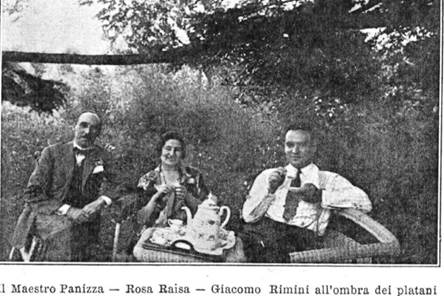 (Panizza visiting the Riminis at their villa in Verona)
(Panizza visiting the Riminis at their villa in Verona)
Re the short October 1933 season, I found this summary review by the great critic, Herbert Peyser, the New York Times critic stationed there, and I quote: “The only recent even that can properly be termed exciting was none of their own doing. [Berlin’s two opera houses] It took the shape of a seven-day Italian “Stagione” – real dyed-in-the-wool Italian opera by a company with a stellar nucleus consisting of Gigli, Rosa Raisa, Toti dal Monte, Angelo Minghetti, Giacomo Rimini, Cesare Formichi and a truly great Italian conductor, Ettore Panizza.” Re some of the performances: “ It was a tingling performance the guests gave us of “Lucia” and a gloriously rollicking “Barbiere” – with Toti dal Monte singing for the most part with a brilliancy and coruscation she never achieved in New York, with an uncommonly powerful Edgardo in Angelo Minghetti and a splendid Figaro in Chicago’s own Giacomo Rimini. The truly “gala’ “Tosca” – with Rosa Raisa a revelation of nobility and dramatic magnificence as the Roman singer and Cesare Formichi a Scarpia who can stand in the presence of Scotti unashamed – was one of the most fiery and thrilling of my experience. Of Gigli the roaring house demanded a repetition of “E lucevan le stelle” – and got it. Panizza, for his part, read the score with an amplitude and a frenzy recalling of Toscanini. And barring Toscanini, I recall no one who plays the “Barbiere” overture as classically and exquisitely, as he.”
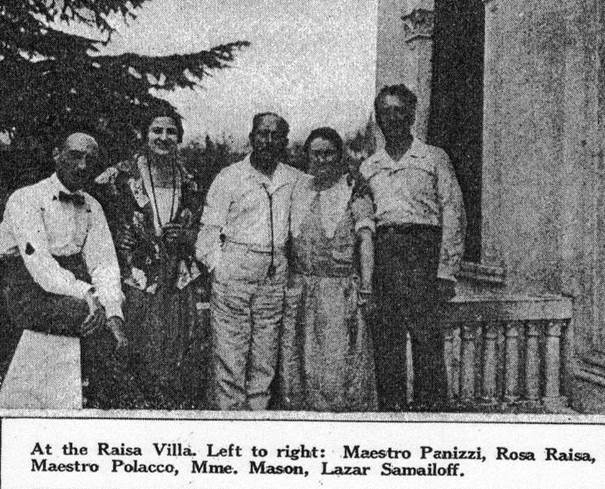
At the 1926 La Scala Turandot premiere season, after the first three performances, Toscanini had a nervous breakdown and Panizza conducted the last five performances. Miguel Fleta only did the first three of the initial run, and Franco Lo Guidice was in the five Panizza performances.
On 7 June 1933 Panizza conducted a handful of performances at the Vienna State Opera with stellar casts, particularly mouth-watering in retrospect was Tannhäuser with Lotte Lehmann, Rose Pauly, Joseph Kalenberg and Friedrich Schorr.
The photo section has several portraits of the conductor and some photos taken with various opera casts, printed in half-tone. There is a very well-researched discography and a very sketchy chronology, thus my highlighting casts and information of interest, but not well-known. A feature of this biography is a section called “anecdotes,” with interesting stories about personages who were involved with Panizza’s work, but stories that did not lend themselves to inclusion in the career narrative part of the book, but which readers might find interesting.
Back to the book under review, it has enough factual and interpretive information to make it a desirable addition to one’s bookshelf.
Charles Mintzer, October 2020